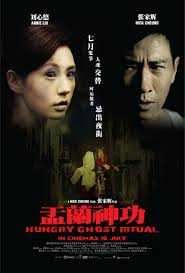Hungry Ghost Ritual
盂兰神功
Malaysia/Hong Kong, 2014, colour, 2.35:1, 80 mins.
Director: Zhang Jiahui 张家辉 [Nick Cheung].
Rating: 5/10.
Hong Kong actor Zhang Jiahui [Nick Cheung] makes a modest directing debut with a Malaysia-set horror.
Malaysia, Aug 2013. After a decade or so away, running a publishing business in China, Zong Hua (Zhang Jiahui) returns home to his father Zong Xiaotian (Lin Wei), who runs the small Ngai Yeung Tin Cantonese Opera troupe, and his younger half-sister Zong Jingjing (Li Yuanling). After being swindled in Mainland China, Zong Hua is broke, and he’s split up with his Mainland girlfriend Zhijun. In another Cantonese Opera troupe, Nam Wan Mok, lead performer Li Yanqiu (Wu Jiali) has mysteriously been plagued with a series of small injuries, and the troupe’s manager (Chen Peijiang) finally replaces her for the final three performances with the younger Xiuling  (Zhang Huihong), much to Li Yanqiu’s displeasure. It is the seventh lunar month, in the run-up to the Hungry Ghost Festival, and everyone in Ngai Yeung Tin troupe is on edge. When Zong Xiaotian is hospitalised after a heart attack, Xiaoyan (Liu Xinyou), the troupe’s lead female performer, suggests that Zong Hua takes over the running for the time being, despite the opposition of some members – especially Xiaoyan’s ex-boyfriend Gui (Cai Zhiqiang) – who think he is inexperienced. While minding her father in hospital, Zong Jingjing is seemingly “grabbed” by a hungry ghost; later, she suddenly becomes interested in Cantonese Opera and asks to study under Xiaoyan. Meanwhile, Xiaoyan, who drunkenly made love one night with Zong Hua, seems to have no knowledge of what she did. After an encounter with a female ghost in the street one night, and with only a few days to go before the troupe’s first performance on the night of the festival, a nervous and confused Zong Hua sets up CCTV cameras around the house.
(Zhang Huihong), much to Li Yanqiu’s displeasure. It is the seventh lunar month, in the run-up to the Hungry Ghost Festival, and everyone in Ngai Yeung Tin troupe is on edge. When Zong Xiaotian is hospitalised after a heart attack, Xiaoyan (Liu Xinyou), the troupe’s lead female performer, suggests that Zong Hua takes over the running for the time being, despite the opposition of some members – especially Xiaoyan’s ex-boyfriend Gui (Cai Zhiqiang) – who think he is inexperienced. While minding her father in hospital, Zong Jingjing is seemingly “grabbed” by a hungry ghost; later, she suddenly becomes interested in Cantonese Opera and asks to study under Xiaoyan. Meanwhile, Xiaoyan, who drunkenly made love one night with Zong Hua, seems to have no knowledge of what she did. After an encounter with a female ghost in the street one night, and with only a few days to go before the troupe’s first performance on the night of the festival, a nervous and confused Zong Hua sets up CCTV cameras around the house.
REVIEW
Hong Kong actor Zhang Jiahui 张家辉 [Nick Cheung], 46, makes a modest debut as a director with Hungry Ghost Ritual 盂兰神功, a Southeast Asian horror movie set and shot in Malaysia, with some local cast and co-finance. Though it’s effective in its own way, the movie is something of a disapointment coming from Zhang, who has gradually become one of Hong Kong’s finest actors during the past decade while remaining in the commercial mainstream. More commonly associated with crime dramas, he’s only acted in one out-and-out horror film so far (the recent That Demon Within 魔警, 2014), though in several psychopath roles (Beast Stalker 证人, 2008; Nightfall 大追捕, 2012) he’s shown a strong affinity for the genre.
Given Zhang’s experience, the suprise of Hungry Ghost is that, as an actor, he gives such a low-key performance and, as a director, appears not to have stretched his cast very far. In several respects the recent directing debut by his fellow actor, Ren Dahua 任达华 [Simon Yam], also with a ghostly horror (Tales from the Dark 1 李碧华鬼魅系列 迷离夜, 2013), was more impressive, despite being just an episode in a portmanteau collection.
Set during the seventh lunar month – when the underworld’s gates open and hungry ghosts roam – Hungry Ghost centres on a small Cantonese opera troupe that’s progressively more haunted as its opening night approaches. The troupe owner’s son (Zhang), who’s just returned home after having had a business venture wiped out in Mainland China, thinks the bad luck may be his own fault. The screenplay, by Malaysian director-producer Zheng Jianguo 郑建国 [Adrian Teh] (The Wedding Diary 结婚那件事, 2011), has considerable psychological potential but hardly pushes the envelope. There’s a typically Southeast Asian (rather than Hong Kong) feel to the movie, with its softer-edged characters, slow-burning atmosphere and light shocks. The resolution to the basically simple plot relies on a mild hoodwinking of the audience.
In that respect, Zhang’s quiet, glum performance fits in well, though in dramatic terms it doesn’t help to drive the film. Fellow Hong Kong veteran Wu Jiali 吴家丽 [Carrie Ng] brings a little extra oomph with her cameo as an opera diva, while Taiwan Canadian actress Liu Xinyou 刘心悠 [Annie Liu] (Mob Sister 阿嫂, 2005; Exodus 出埃及记, 2007; Shamo 军鸡, 2007) provides the most substantial performance as a troupe member who’s sweet on Zhang’s character. However, more over-the-top moments (as when Liu’s character verbally attacks the troupe’s owner in hospital) would have benefited the film as a whole. Among the local cast, Malaysian hottie Li Yuanling 李元玲, 25, is okay as a bitchy step-sister who undergoes a sudden change.
Technical credits get the job done. The soft, pastel colours of Malaysian d.p. Sun Rongzhang 孫榮章 (who shot local scenes for Conspirators 同谋, 2013, starring Zhang) evoke a Southeast Asian flavour, while Hong Kong editor Peng Zhengxi 彭正熙 [Curran Pang], who cut both Conspirators and That Demon Within, sensibly brings the whole thing in at a tight 80 minutes. Along with some jaws-of-hell sound effects, the ghostly sequences, featuring contorted and suspended bodies, are fine, especially in the finale. Outside its home territories, the film is marketed as Ghost Rituals.
CREDITS
Presented by Asia Tropical Films (MY), Sundream Motion Pictures (HK), PMP Entertainment (MY), dK Films Production (MY). Produced by Asia Tropical Films (MY).
Script: Zheng Jianguo [Adrian Teh]. Photography: Sun Rongzhang. Editing: Peng Zhengxi [Curran Pang]. Music: Origin Kampanee. Art direction: Fu Wenhui. Styling: Huang Juqing, Shen Xuefen, Huang Jiabao [Stephanie Wong]. Sound: Pan Keqiang. Action: Ong Cheng Hoon. Visual effects: Huang Mingxi. Cantonese Opera consultation: Cai Yanxiang.
Cast: Zhang Jiahui [Nick Cheung] (Zong Hua), Liu Xinyou [Annie Liu] (Xiaoyan), Lin Wei (Zong Xiaotian, Zong Hua’s father, troupe owner), Li Yuanling (Zong Jingjing, Zong Hua’s daughter), Chen Peijiang (other troupe owner), Zhang Huihong (Xiuling), Wu Jiali [Carrie Ng] (Li Yanqiu), Ye Qingfang (Kun), Cai Zhiqiang (Gui), Di Fei (Min, troupe actress), Pan Zhijian.
Release: Malaysia, 10 Jul 2014; Hong Kong, 10 Jul 2014.
(Review originally published on Film Business Asia, 29 Oct 2014.)
